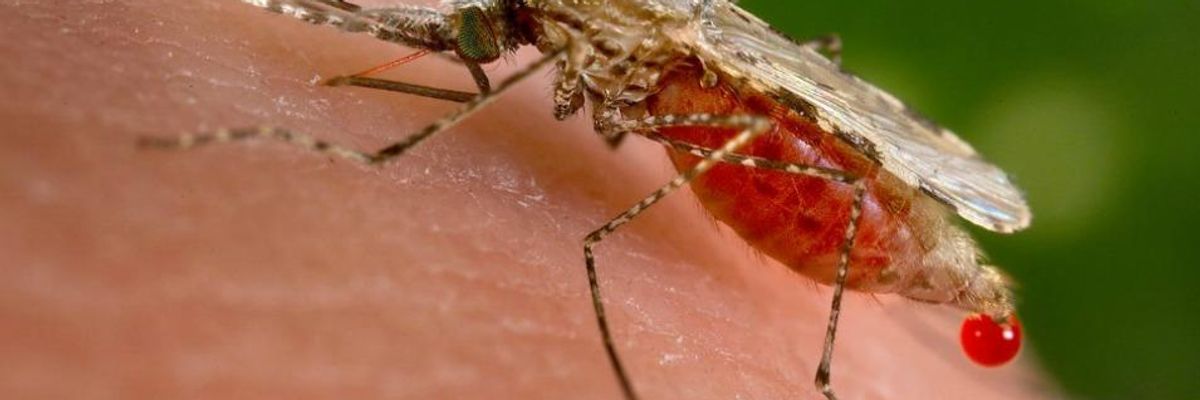

SUBSCRIBE TO OUR FREE NEWSLETTER
Daily news & progressive opinion—funded by the people, not the corporations—delivered straight to your inbox.
5
#000000
#FFFFFF
To donate by check, phone, or other method, see our More Ways to Give page.


Daily news & progressive opinion—funded by the people, not the corporations—delivered straight to your inbox.

The Anopheles stephensi mosquito is a vector of malaria. (Photo: CDC/ Dr. William Collins)
An experimental anti-malaria vaccine manufactured by pharmaceutical giant GlaxoSmithKline has shown promise at preventing the mosquito-born disease among children and infants, a new study finds.
The publication follows GSK's announcement last week that it is applying for approval from European Union regulatory bodies to put the first-ever malaria vaccine on the market.
Published Tuesday in PLOS Medicine, the vaccine research followed the infection rates of 6,537 infants (6 to 12 weeks old) and 8,923 children (5 to 17 months old) who were administered the vaccine at "11 African Sites" where Malaria is prevalent.
Over the course of 18 months, the researchers found that the vaccine "averted an average of 829 and 449 cases of clinical malaria per 1,000 children and infants vaccinated, respectively."
According to the study's authors, the findings show significant effectiveness and suggest that the vaccine "could have a major public health impact in sub-Saharan Africa."
Malaria disproportionately affects poor and rural communities in the global south, hitting sub-Saharan Africa the hardest. Despite being preventable and curable if addressed promptly, the disease is a top cause of death and illness throughout the developing world, killing approximately 1.2 million people a year, the vast majority of them children.
Trump and Musk are on an unconstitutional rampage, aiming for virtually every corner of the federal government. These two right-wing billionaires are targeting nurses, scientists, teachers, daycare providers, judges, veterans, air traffic controllers, and nuclear safety inspectors. No one is safe. The food stamps program, Social Security, Medicare, and Medicaid are next. It’s an unprecedented disaster and a five-alarm fire, but there will be a reckoning. The people did not vote for this. The American people do not want this dystopian hellscape that hides behind claims of “efficiency.” Still, in reality, it is all a giveaway to corporate interests and the libertarian dreams of far-right oligarchs like Musk. Common Dreams is playing a vital role by reporting day and night on this orgy of corruption and greed, as well as what everyday people can do to organize and fight back. As a people-powered nonprofit news outlet, we cover issues the corporate media never will, but we can only continue with our readers’ support. |
An experimental anti-malaria vaccine manufactured by pharmaceutical giant GlaxoSmithKline has shown promise at preventing the mosquito-born disease among children and infants, a new study finds.
The publication follows GSK's announcement last week that it is applying for approval from European Union regulatory bodies to put the first-ever malaria vaccine on the market.
Published Tuesday in PLOS Medicine, the vaccine research followed the infection rates of 6,537 infants (6 to 12 weeks old) and 8,923 children (5 to 17 months old) who were administered the vaccine at "11 African Sites" where Malaria is prevalent.
Over the course of 18 months, the researchers found that the vaccine "averted an average of 829 and 449 cases of clinical malaria per 1,000 children and infants vaccinated, respectively."
According to the study's authors, the findings show significant effectiveness and suggest that the vaccine "could have a major public health impact in sub-Saharan Africa."
Malaria disproportionately affects poor and rural communities in the global south, hitting sub-Saharan Africa the hardest. Despite being preventable and curable if addressed promptly, the disease is a top cause of death and illness throughout the developing world, killing approximately 1.2 million people a year, the vast majority of them children.
An experimental anti-malaria vaccine manufactured by pharmaceutical giant GlaxoSmithKline has shown promise at preventing the mosquito-born disease among children and infants, a new study finds.
The publication follows GSK's announcement last week that it is applying for approval from European Union regulatory bodies to put the first-ever malaria vaccine on the market.
Published Tuesday in PLOS Medicine, the vaccine research followed the infection rates of 6,537 infants (6 to 12 weeks old) and 8,923 children (5 to 17 months old) who were administered the vaccine at "11 African Sites" where Malaria is prevalent.
Over the course of 18 months, the researchers found that the vaccine "averted an average of 829 and 449 cases of clinical malaria per 1,000 children and infants vaccinated, respectively."
According to the study's authors, the findings show significant effectiveness and suggest that the vaccine "could have a major public health impact in sub-Saharan Africa."
Malaria disproportionately affects poor and rural communities in the global south, hitting sub-Saharan Africa the hardest. Despite being preventable and curable if addressed promptly, the disease is a top cause of death and illness throughout the developing world, killing approximately 1.2 million people a year, the vast majority of them children.